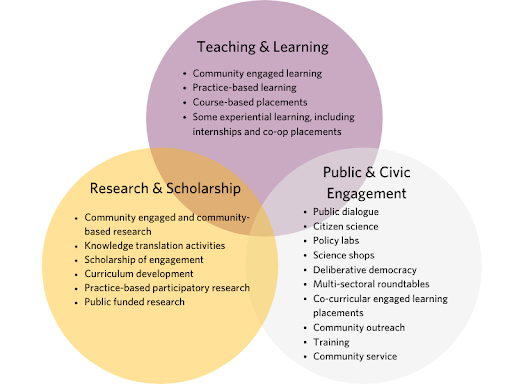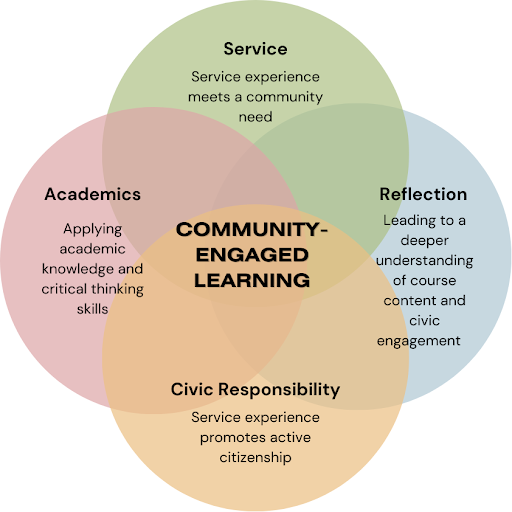definitions & pedagogy
SDSU Community Engagement (CE) Ecosystem
Community-engaged teaching and learning, research and scholarship, and public and civic engagement are interconnected pillars of a university's community engagement ecosystem, each fostering reciprocal partnerships that address societal needs while enriching academic experiences. Together, they create a cohesive framework that integrates education, inquiry, and service to advance the public good.

CE Teaching & Learning @ SDSU
The Office of Academic Community Engagement (ACE) supports the campus' goals related to community-engaged teaching and learning. ACE supports the overall community engagement ecosystem by guiding and supporting faculty, students, and community partners in developing meaningful, course-based community engagement experiences. Through faculty development, curricular consultation, partnership facilitation, and assessment support, the office ensures that community-engaged courses are academically rigorous, mutually beneficial, and aligned with broader institutional goals for public impact.

SDSU University Senate-approved Definitions
Community Engagement (CE) describes collaboration between institutions of higher education and their larger communities (local, regional/state, national, global) for the mutually beneficial exchange of knowledge and resources in a context of partnership and reciprocity.
Service Learning (SL) entails active student participation in intentional and collaborative service experiences that help promote long-term community development and civic engagement. Service Learning projects significantly relate to course content as well as enrich student education through the acquisition of professional skills in a practical (or applied) setting while also satisfying the needs of partner institutions. Through distinctive various pedagogical activities involving reflection, students enhance their sense of civic responsibility, self-awareness, and commitment to the community.
Service Learning Taxonomy
All Service Learning (SL) is community engaged learning, but not all Community Engagement (CE) is service learning. To be considered Service Learning, a course must implement a specific pedagogical approach and incorporate all elements of the following taxonomy:
- Reciprocal Partnerships
- Benefits the Common Good
- Academically Relevant Community Involvement
- Explicit Service Learning Goals
- Critical Reflection Facilitates Learning
- Integrated Assessment of Student Learning
>> Download The CSU's Taxonomy Chart with Definitions